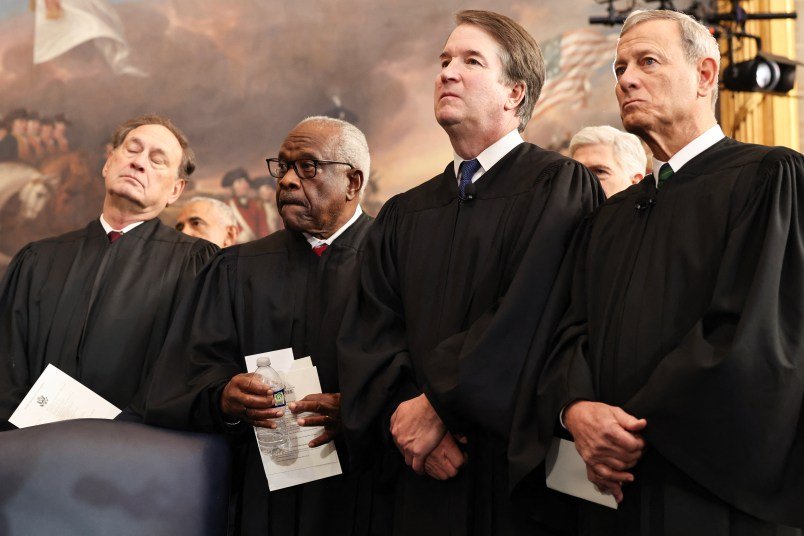President Trump notched a startling legal win Friday evening, as the Supreme Court gave an early stamp of approval to a legal theory so outlandish that experts at one point predicted to TPM it wouldn’t “get a single vote.”
The Court blessed, at the preliminary stage, Trump’s gambit to zero out money Congress already appropriated. With one weird timing trick, the administration claimed, it could request that the money not be spent close enough to the end of the fiscal year that the funds would simply freeze indefinitely. The theory — called a “pocket rescission” — is at near comical odds with the text of the Impoundment Control Act, specifically passed to restrict this exact presidential infringement upon Congress’ spending powers.
“The Government, at this early stage, has made a sufficient showing that the Impoundment Control Act precludes respondents’ suit, brought pursuant to the Administrative Procedure Act, to enforce the appropriations at issue here,” wrote the majority, once again leaving their names off a major emergency docket ruling.
The justices imply that they buy the Trump administration’s (very novel) argument that the group that brought the suit, an organization that would see its funding taken by this rescission, lacks standing.
“Major victory,” tweeted Office of Management and Budget Director Russ Vought, the architect behind the pocket rescission “theory.”
Justice Elena Kagan, joined by the other two liberals, wrote a dissent about the dangers of deciding such monumental cases hastily, without briefing and argument, on the emergency docket.
“In a few weeks’ time — when we turn to our regular docket — we will decide cases of far less import with far more process and reflection,” she wrote.
Then she turned to the desecration of the separation of powers, noting that Trump’s displeasure with Congress’ spending decisions is not a real argument against them.
“That is just the price of living under a Constitution that gives Congress the power to make spending decisions through the enactment of appropriations laws,” she wrote, adding that “it is merely a frustration any President must bear.”
The order is a resounding win for Trump, further proof that the right-wing majority will find a way to expand his power no matter how flimsy the argument. The administration, in turn, is acting with the hubris of a White House that just crossed a major boundary and was congratulated for it.
The same evening the Court handed down its order, the administration asked the justices, again, to take up its birthright citizen case. The attempt to strip undocumented immigrants and short-term visa holders of their citizenship rights was the first priority of the new Trump administration, though the executive order has lain dormant after four federal judges blocked it as blatantly unconstitutional.
While a prong of the birthright citizenship order reached the Court earlier this summer, it was only a narrow vehicle for convincing the justices to blunt the power of national injunctions (they complied).
So the administration is now serving up the brunt of its argument, an extraordinary challenge to the Constitution via an extraordinary process, as Trump isn’t bothering to wait for lower court appellate decisions.
“The Clause was adopted to confer citizenship on the newly freed slaves and their children, not on the children of aliens temporarily visiting the United States or of illegal aliens,” wrote the government in its new brief.
The administration got additional happy legal news this week, as Justice Clarence Thomas told a public audience at Catholic University on Thursday that precedent is not “the gospel,” not findings the justices should accept blindly “as some sort of talismanic deal.”
These remarks come as the Court seems close to overturning Humphrey’s Executor v. U.S. (protecting members of independent agencies from at-will firing), Thornburg v. Gingles (allowing for the use of race in redistricting) and is mulling taking the opportunity to overturn the right to same-sex marriage (Obergefell v. Hodges). Thomas himself urged the Court in Dobbs to add Griswold v. Connecticut and Lawrence v. Texas to that list, the right to contraceptives for married couples and to consensual sexual conduct, respectively.
“It’s not some sort of automatic deal where you can just say, ‘stare decisis,’ and then turn off the brain,” Thomas said Thursday at the event.
“We never go to the front, see who’s driving the train, where is it going. And you could go up there in the engine room, find it’s an orangutan driving the train,” he added.
